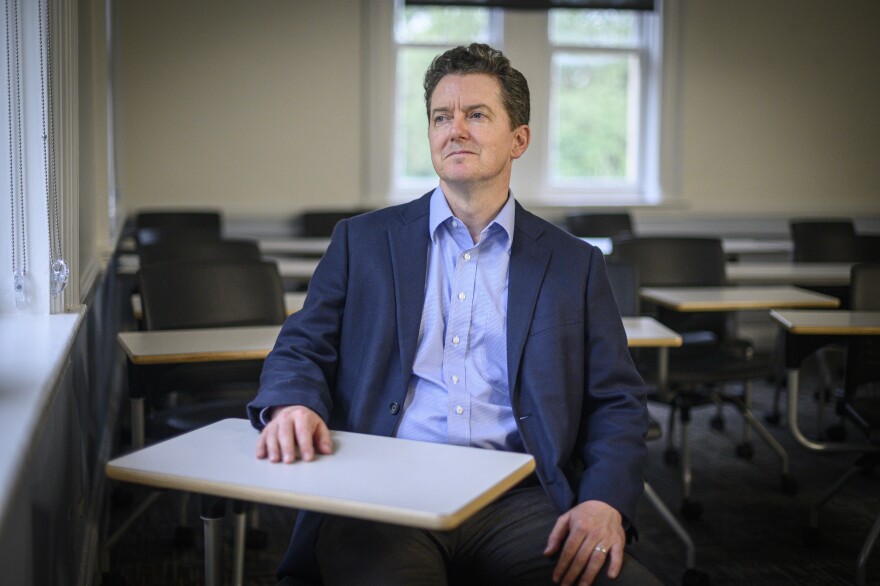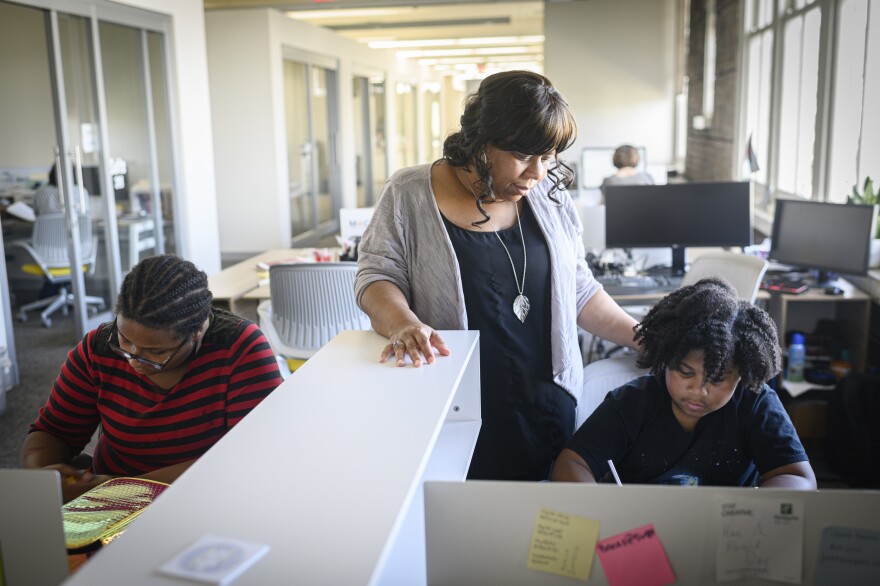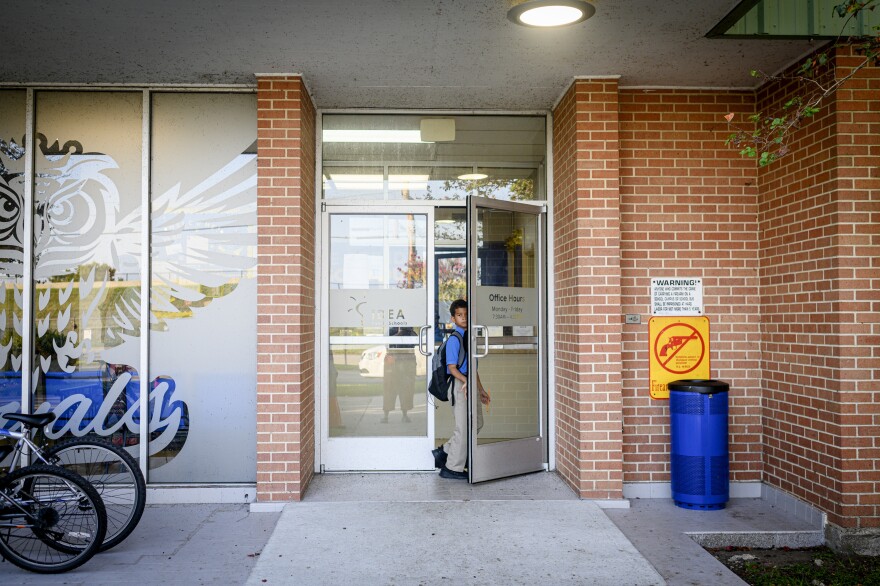On a clear morning in late August, 9-year-old Alongkorn Lafargue hops in the back seat of his father's car. He's wearing his school uniform: neatly ironed khakis and a bright blue polo shirt embroidered with the logo of his new charter school, IDEA Oscar Dunn. Alongkorn has been going there only a few weeks, and his dad, Alex Lafargue, says he has struggled to get his son to talk about what it's like.
"He was anxious," Lafargue says. "And [its] his third week there now. He's starting to open up."
Alongkorn is going to a new school because New Orleans' school district shut down his old one, Medard H. Nelson Charter School, for its students' poor performance on standardized tests.
Alongkorn went to Nelson for five years. Lafargue acknowledged that the school had problems — most notably, a revolving door of leadership. The school had three different principals in its last four years of operation. But the Lafargues built a community at Nelson. And the school was just down the street — a six-minute walk door to door.
"This was a great school," Lafargue said. "Orleans Parish School Board [NOLA Public Schools] surely has not allowed me the choice to let him stay with family, to let him stay in the neighborhood, to let him stay within a rich environment that he has pulled from since pre-K."
Lafargue said many students, including his son, were confused and upset when they found out the school got an F and was closing.
"That was a bad day," Lafargue said, describing the day Alongkorn came home and asked if he was an "F student."
"Of course the students here felt that they were failures, and that's not true!" he said. "I had to let my son understand, 'Your school is not a failing school. You are not a failure.' "
At the stoplight near the end of Lafargue's block, he points out the driver-side window at Nelson, a large, two-story, tan-brick building surrounded by live oaks. Except, it's not Nelson anymore. Now posters along the fence advertise a different school, with a new name.
Perform or close
School closures are a key part of the New Orleans school reform strategy.
In exchange for their relative autonomy, charter schools have a mandate: perform or close. According to district officials, Medard H. Nelson Charter School did not uphold its end of the bargain. The school earned an F from the state for the last four years based on standardized test scores. Just 11% of students tested at "mastery" level (which the state considers grade level) in recent years.
"We have to hold the line somewhere," NOLA Public Schools Senior Chief Amanda Aiken said. "That is the job that we have. It's to make those tough decisions, but to take in all of the data we have and say this school is not preparing kids to be successful. What is our next step here?"
In New Orleans, that next step is often closure or handing the school to a different charter operator. According to Tulane University researcher Douglas Harris, this strategy has worked for students.
"Certainly there's gonna be an initial disruption," Harris said. "But if they end up moving to a better school, that may all be OK in the long term."
Harris' research team followed New Orleans students from schools, like Nelson, that were closed for having low test scores. Students had an initial dip in test scores after the closures, but two years later, their test scores were higher than those of students who stayed in F-rated schools. And Harris' newest research suggests that the rise in New Orleans' overall test scores is directly tied to school closures and takeovers.

"If you're doing [closures and takeovers] well, then those opening schools are better than the ones that you're closing and taking over," Harris said. "That's going to lead to improvement in the city over time — and it did."
Research from Tulane shows that before 2005's Hurricane Katrina, just 6% of New Orleans students tested at the mastery level. By 2016, more than 30% were at mastery. Since then, scores have been stagnant or even declining. But Harris said closures and takeovers are still having an overall positive impact.
The caveat, Harris said, is that closure works only when you send a student to a higher-performing school. He points to studies in other parts of the United States, where closures were tied to lower student performance down the road, and says that this may be because students were not transferring to good schools.
"It's not just whether a school closes," Harris said. "What matters is whether the student ends up in a better school. That's ultimately the key thing."
As part of its closure strategy, NOLA Public Schools tries to make sure students from closed schools end up at better ones. The district gives families from closing schools first dibs on open seats in the school of their choice. Data provided by the district shows that 80% of students from closing schools (mostly F-rated schools) ended up in C-rated schools this year.
"The way our system behaves is insane"
Not everyone agrees that closures and takeovers are the answer. Ashana Bigard is a parent and activist who runs several organizations advocating for students and helping parents navigate New Orleans schools. She said the constant churn and burn of schools is destabilizing for students and their families.
"The way our system behaves is insane," she said. "Children do not need to be constantly upheaved, their education disrupted, their friendships, their relationships that they're just forming with teachers and administration."
Bigard points to research showing that one of the most important things students need to thrive is stability, including stable relationships with teachers. This is especially true for students who have experienced trauma — and New Orleans children have rates of post-traumatic stress disorder more than three times the national average.

When a school is failing, Bigard says, the district should intervene.
"Let's find out why they're failing," Bigard said.
But even if the district does know why a charter school is failing, district officials are wary of breaching a charter school's autonomy. And in many cases, state law prevents intervention by NOLA Public Schools and the locally elected school board that runs it. For example, at Nelson, staff members say unstable leadership drove down test scores. But it was the charter group, New Beginnings Schools Foundation, that was responsible for hiring decisions. The district had no say.
In some areas, the district has tested the boundaries of charter autonomy. After a sharp increase in the expulsion rate, the parish school board centralized the expulsion process. The district has also halted enrollment at charter schools with poor test scores. Last year, the parish school board forbade bus pickups before 6:05 a.m. And after a recent grade-fixing scandal at a high school (also run by New Beginnings Schools Foundation), NOLA Public Schools pledged to audit high school transcripts across the district.
But parents like Bigard and Lafargue want the locally elected school board to go further and behave more like a traditional school district.
Harris from Tulane said the district is still evolving.
"The district is now struggling to figure out what its role should be in providing direct assistance to schools to help them improve," Harris said.
Moving forward
This year, getting to school isn't as simple as the six-minute walk Lafargue and his son used to make to Nelson. Alongkorn's new school, IDEA Oscar Dunn, is in another neighborhood nine miles away. Lafargue said it takes an hour on the school bus, so he drives Alongkorn himself every day in his compact Chevy sedan.
Lafargue landed on IDEA Oscar Dunn after realizing that because it's a brand-new school, it's unlikely the district will close the school in the next four years. Lafargue doesn't want to go through another closure. He also likes the fact that the new school's charter management organization, Texas-based IDEA, has a fairly successful track record when it comes to test scores.
"They have longevity," Lafargue said. Lafargue believes IDEA can replicate its success in New Orleans.
Twenty minutes after we pass the old Nelson building, Lafargue and his son arrive at IDEA Oscar Dunn. It's in an old building that has seen a number of schools come and go. Lafargue walks his son up to the front and sends him through the foggy glass doors. Overhead, big metal marquee letters read simply "Elementary School." There's a blank space where the school's old name used to be.

"Have a good day, buddy," Lafargue tells Alongkorn.
Lafargue thinks Alongkorn will be OK. He says he sees little signs that his son wants to be at school. Today, he caught Alongkorn checking his hair style. After waving goodbye, Lafargue continues around to the cafeteria for a breakfast meet-and-greet with the principal.
A handful of parents are gathered around a few Formica tables and boxes of pastries. Lafargue grabs a cinnamon bun for himself and a croissant to save for Alongkorn for after school. Then he lays out a number of folders and pamphlets across one table — materials for several parent groups he joined when he was fighting Nelson's closure.
"You've inherited a lot," Lafargue warns the new principal, and explains how several families came to Oscar Dunn as a result of closures. "It's not a good thing a lot of parents have gone through. And I dare say, some of the kids," he says. "But I'm thankful that you're here."
Lafargue is beginning to build his new school community at IDEA Oscar Dunn. And Harris' research suggests that if the school performs like other IDEA charter schools, Alongkorn may do better academically at Oscar Dunn than he would have at Nelson.
But Lafargue is still not over the loss of his Nelson school community. Bigard, the activist, has begun organizing parents to file a lawsuit calling for a moratorium on school closures and new charter school openings.
Lafargue was one of the first parents to sign on.
Copyright 2021 NPR. To see more, visit https://www.npr.org.



